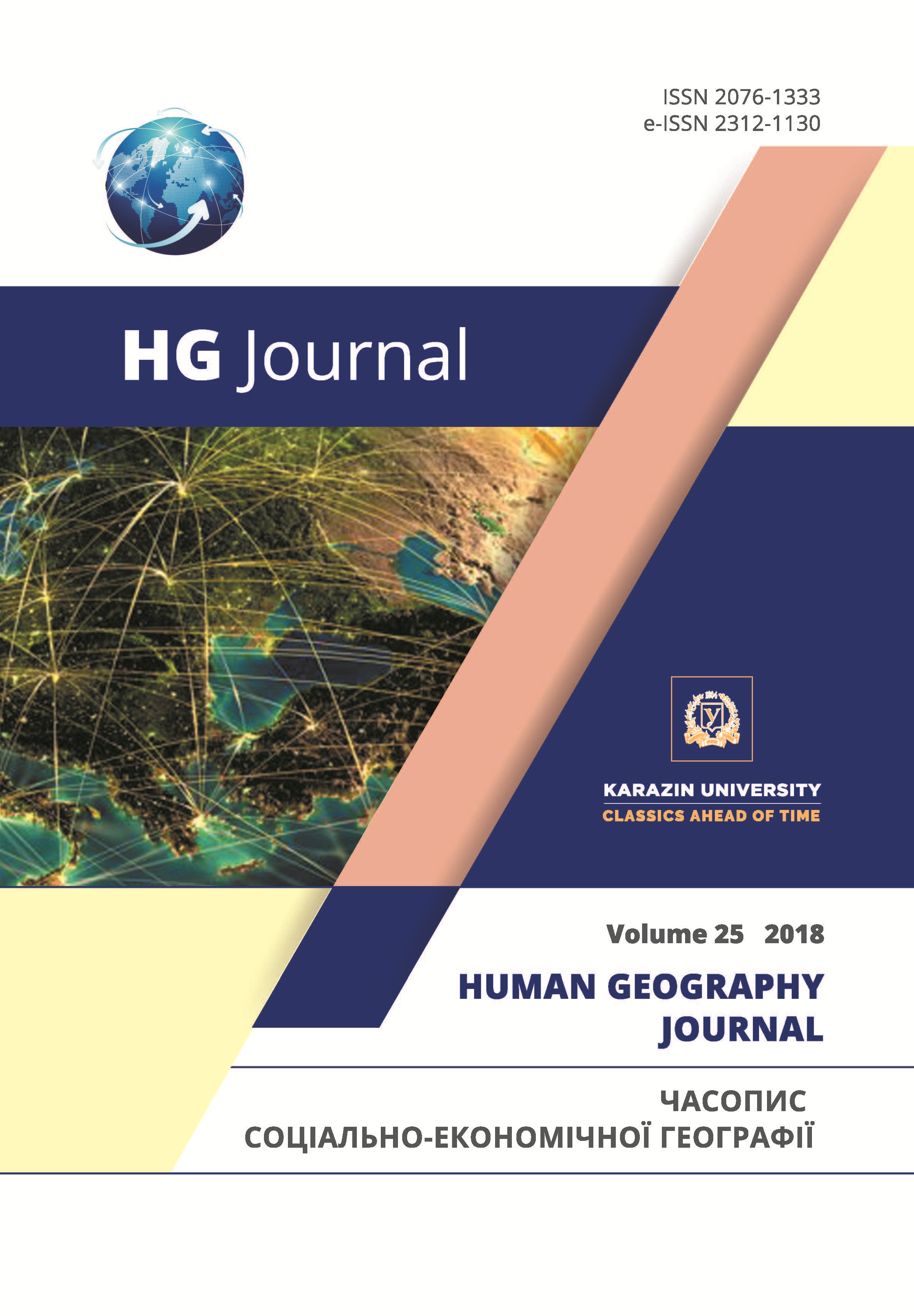Вплив управління знаннями на інновації. Польове дослідження туристичних агентств у місті Ірбід, Йорданія
Анотація
Ця стаття присвячена вивченню впливу процесу управління знаннями, створення знань, обміну знаннями, застосування знань і зберігання знань, інновацій. Відповідно, було проведено анкетування для перевірки згаданої вище моделі, заснованої на наборі даних з опитування 122 співробітників туристичних агентств в Йорданії. Дотримуючись аналітичного описовому методу, проводиться аналіз зв'язку між незалежною змінною (процес управління знаннями) і залежною змінною (інновація), метою якого є визначення впливу незалежної змінної на залежну. Щоб досягти мети дослідження, була розроблена анкета з 24 питань для збору первинної інформації від досліджуваної групи, а потім проаналізовано з використанням SPSS V 22, була проведена множинна регресія для перевірки гіпотез статті.
Результати показали, що процес знань (створення знань, обмін знаннями та зберігання знань) позитивно і суттєво впливає на інновації. Однак застосування знань майже не позначається на інноваціях, і ці результати узгоджуються з результатами аналізу наукової літератури. Результати мають велике значення для туристичних агентств в Йорданії. Дослідження надало низку рекомендацій щодо прискорення впровадження управління знаннями в туристичних агентствах Йорданії. Результати цього дослідження показують, що фірмам може бути краще з точки зору ефективності інновацій, якщо вони засновані на системі мотивації / компенсації за діяльність у сфері створення знань. Коли традиційні економічні показники замінюються такими індикаторами як створення знань, участь і використання, співробітники, швидше за все, будуть працювати з цими видами діяльності і, таким чином, покращувати ефективність усіх інновацій компанії.
Завантаження
Посилання
Teixeira, E.K., Oliveira, M., Curado, C.M. (2018). Knowledge management process arrangements and their impact on innovation. Business Information Review, 35(1), 29-38.
Bolisani, E., Bratianu, C. (2017). Knowledge strategy planning: an integrated approach to manage uncertainty, turbulence, and dynamics. Journal of Knowledge Management, 21(2), 233-253.
Dayan, R., Heisig, P, Matos, F. (2017). Knowledge management as a factor for the formulation and implementation of organization strategy. Journal of Knowledge Management, 21(2), 308-329.
Chawinga, W.D., Chipeta, G.T. (2017). A synergy of knowledge management and competitive intelligence: a key for competitive advantage in small and medium business enterprises. Business Information Review, 34(1), 25-36.
Bader Yousef Obeidat, Mai Maher Al-Suradi, Ra’ed Masa’deh, Ali Tarhini (2016). The impact of knowledge management on innovation: An empirical study on Jordanian consultancy firms. Management Research Review, 39(10), 1214-1238.
Sivalogathasan, V., Wu, X. (2015). Impact of Organization Motivation on Intellectual Capital and Innovation Capability of the Textile and Apparel Industry in Sri Lanka. International Journal of Innovation Science, 7(2), 153-168.
Kamukama, N., Ahiauzu, A., Ntayi, J.M. (2010). Intellectual capital and performance: testing interaction effects. Journal of Intellectual Capital, 11(4), 554-574.
Obeidat, B.Y., Al-Suradi, M., Masa’deh, R., Tarhini, A. (2016). The impact of knowledge management on innovation: An empirical study on Jordanian consultancy firms. Management Research Review, 39(10), 1214-1238.
Abualoush, S.H., Obeidat, A., Tarhini, A., Masa’deh, R., Al-Badi, A. (2018). The role of employees’ empowerment as an intermediary variable between knowledge management and information systems on employees’ performance. VINE Journal of Information and Knowledge Management Systems, 48(2), 217-237.
Masa’deh, R. (2016). The role of knowledge management infrastructure in enhancing job satisfaction at Aqaba five star hotels in Jordan. Communications and Network, 8(4), 219-240.
Nonaka, I., Toyama, R., Konno, N. (2000). SECI, ba and leadership: a unified model of dynamic knowledge creation. Long Range Planning, 33(1), 5-34(24).
Fombad, M. (2018). Knowledge management for poverty eradication: a South African perspective. Journal of Information, Communication and Ethics in Society, 16(2), 193-213.
Lin, C.-P. (2007). To share or not to share: modeling tacit knowledge sharing, its mediators and antecedents. Journal of Business Ethics, 70(4), 411-428.
Nonaka, I, Byosiere, P, Borucki, C.C, et al. (1994). Organizational knowledge creation theory: a first comprehensive test. International Business Review, 3(4), 337-351.
Jimenez-Jimenez, D., Martinez-Costa, M., Sanz-Valle, R. (2014). Innovation, organizational learning orientation and reverse knowledge transfer in multinational companies. The Electronic Journal of Knowledge Management, 12(1), 47-55.
Chen, C.-J., Huang, J.-W., Hsiao, Y.-C. (2010). Knowledge management and innovativeness: the role of organizational climate and structure. International Journal of Manpower, 31(8), 848-870.
Lee, V., Leong, L., Hew, T., Ooi, K. (2013). Knowledge management: a key determinant in advancing technological innovation? Journal of Knowledge Management, 17(6), 848-872(35).
Chen, C.-J., Huang, J.-W., Hsiao, Y.-C. (2010). Knowledge management and innovativeness: the role of organizational climate and structure. International Journal of Manpower, 31(8), 848-870.
Wang, D., Chen, S. (2013). Does intellectual capital matter? High-performance work systems and bilateral innovative capabilities. International Journal of Manpower, 34(8), 861-879.
Castro, G.M., Delgado-Verde, M., Amores-Salvadó, J., Navas-López, J.E. (2013). Linking human, technological, and relational assets to technological innovation: exploring a new approach. Knowledge Management Research & Practice, 11(2), 123-132.
Menor, L.J., Kristal, M.M., Rosenzweig, E.D. (2007). Examining the influence of operational intellectual capital on capabilities and performance. Manufacturing and Service Operations Management, 9(4), 559-578.
Travica, B. (2013). Conceptualizing knowledge culture. Online Journal of Applied Knowledge Management, 1(2), 85-104.
Monavvarian, A., Khamda, Z. (2010). Towards successful knowledge management: people development approach. Business Strategy Series, 11(1), 20-42(29).
Цитування
Knowledge Management and Innovation in Agricultural Organizations:
Flores Lopez Jose Guadalupe, Ochoa Jiménez Sergio & Jacobo Hernandez Carlos Armando (2021) Cuadernos de Desarrollo Rural
Crossref
Авторське право (c) 2018 Omoush M.M.

Цю роботу ліцензовано за Міжнародня ліцензія Creative Commons Attribution 4.0.




